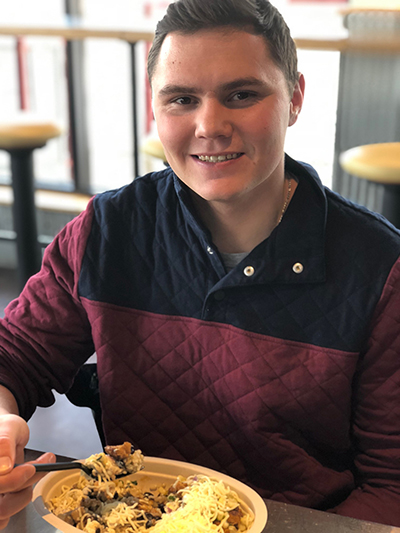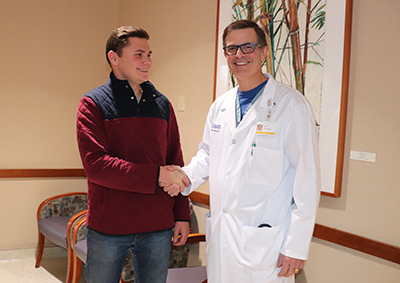‘No-no’ foods for GERD patient are now a ‘yes, yes’
December 21, 2018

When Jakub Koziuk thinks back to his worst gastroesophageal reflux disease (GERD) moments, he recalls how horrible bananas were to digest, and how often he’d regurgitate his food back up and have to swallow it down again. Since he suffered with this issue since he was a child, he assumed this was how digestion worked.
“I didn’t think of it at all,” says the 26-year-old Des Plaines resident. “It happened so often, and being so young, I thought it was normal.”
But the acid reflux was anything but normal, and after repeated trips to the dentist ― first a root canal at age 8 and then multiple crowns following over the years ― his dentist urged him to see a physician to investigate why his teeth were rapidly eroding.
“She said I had teeth that looked like a 50- or 60-year-old,” Jakub recalls. “She couldn’t pinpoint what it was.”
It was discovered that the reflux that had been plaguing Jakub during the day also was coming up at night, bathing his teeth in acid and destroying them.
“I’d gone to different physicians and they’d prescribe over-the-counter heartburn medication,” he says. “That was fine, but eventually I knew I had to get off of the pills.”
The heartburn medication, coupled with antacid medication, would control the acid, but the food was still coming up. Doctor after doctor told Jakub it was normal. After being on medication for several years, he knew he needed a solution.
An aha moment
While driving to work one day, a Northwest Community Healthcare (NCH) billboard offering acid reflux treatment caught Jakub’s eye and led him to make an appointment with Willis Parsons, M.D., Medical Director of the NCH Gastroenterology Center.
“It wasn’t until I visited Dr. Parsons’ practice that I actually talked to someone who understood my issue,” Jakub says. “The diagnosis was GERD, and with GERD comes acid reflux.”
Dr. Parsons and his staff focused on Jakub’s reported symptoms of heartburn, regurgitation and his goal of discontinuing his PPI ― proton pump inhibitors ― due to concern over the long-term effects of the medication.
“Jakub has had a long-time history of GERD with an onset of symptoms in his teens, which is not typical,” Dr. Parsons says. “Although he suffered for years, there was no permanent damage to his esophagus, most likely from being on PPIs to control the symptoms.”
TIF procedure
On August 22, 2017, Jakub underwent a transoral incisionless fundoplication (TIF) procedure to treat GERD without surgery. Dr. Parsons reported that he had a favorable outcome.
“TIF is done endoscopically, meaning there are no incisions,” explains Dr. Parsons. “There is an 80 percent success rate. Success means the ability to discontinue the medicine for acid reflux.”
Back to work in less than a week, Jakub carefully graduated from a liquid to a solid diet over the course of 12 weeks and by Thanksgiving, he was feeling normal. His new normal meant feeling for the first time in his life what it’s like to be full.
“I never really had the fullness before because there was always an exit for it,” he says. “I’m still getting used to it and I’m careful not to overeat.”

No more ‘No-no’ foods
The unimaginable acid reflux he used to experience with bananas, onions and tomatoes is completely gone, allowing him to enjoy burrito bowls, hot wings and other foods. TIF also halted the erosion of his teeth.
“Now that we have the acid under control, my teeth will not have further damage,” Jakub says.
A recent visit to his dentist revealed that his body chemistry is starting to look like other healthy patients. Jakub never thought he’d celebrate having tarter buildup between cleanings, but it’s another happy first for him.
“I would never have tarter buildup on my teeth because the acid would erode it,” Jakub says. “My dentist said, ‘I’ve never seen this much tarter on you.’”
He’s thankful to Dr. Parsons for performing a life-changing procedure that enabled him to go off of his medication and eat normally.
“Dr. Parsons and his staff were great,” he says. “They’re super energetic, confident and excited about this procedure and that gave me peace of mind.”
Learn more about testing and procedures for GERD at nch.org/refluxrelief.
No case is the same, results may vary.
Nearly 30 percent of Americans suffer from GERD. It occurs when stomach acid flows back into the esophagus (the tube connecting your mouth and stomach). Symptoms may include:
- A burning sensation in your chest, usually after eating
- Burning may be worse at night
- Chest pain
- Difficulty swallowing
- Regurgitation of food or sour liquid
- Sensation of a lump in your throat
Are you at risk?
Conditions that may increase your risk for GERD include:
- Obesity
- Hiatal hernia
- Pregnancy
- Connective tissue disorders, such as scleroderma
- Delayed stomach emptying
Factors that can aggravate acid reflux include:
- Smoking
- Eating large meals or eating late at night
- Eating certain foods, such as fatty or fried foods
- Drinking certain beverages, such as alcohol or coffee
- Taking certain medications, such as aspirin
Source: Mayo Clinic